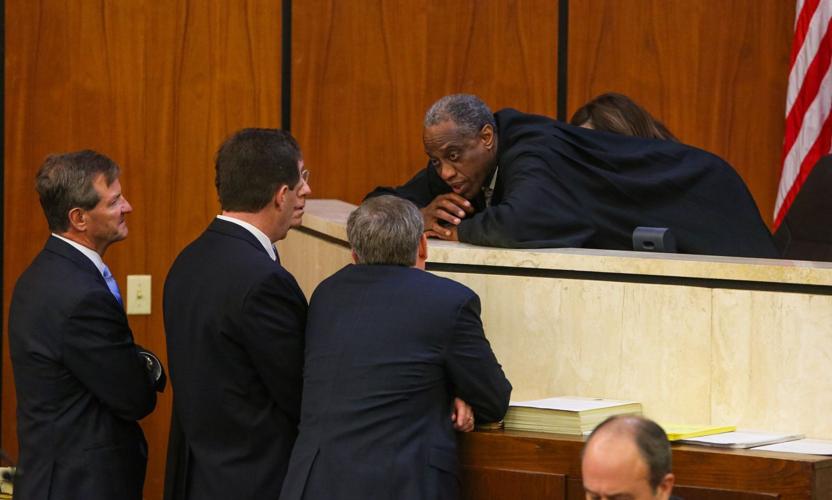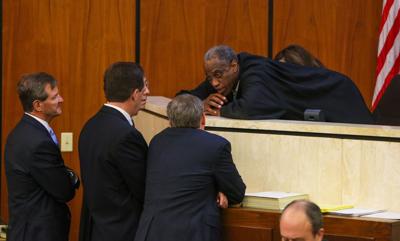S.C. Circuit Judge Casey Manning’s secret order releasing a murderer 16 years early was irregular not just because he issued it without holding a hearing so police and victims could object. It also was irregular because he issued it without receiving the motion from a prosecutor that state law requires.
As 5th Circuit Solicitor Byron Gipson finally revealed two days after The Post and Courier uncovered the apparently illegal and possibly unconstitutional decision to slash Jeroid Price’s sentence nearly in half, the judge had already signed the order before he had a chance to file that motion, so he didn't.
I suppose it's easy enough to understand why Judge Manning was in such a hurry: His order was signed on Dec. 30 — the day before he retired and ceased to be a judge. And since Dec. 31 was a Saturday, it was his last working day on the bench.

Cindi Ross Scoppe
But as irregular as Casey Manning’s premature emancipation was, it wasn’t the first time a S.C. Circuit Court judge was on his way out the door when he got a sketchy request from an attorney to issue a hasty order that so clearly violated state law and potentially the state constitution that it was overturned by a unanimous state Supreme Court as soon as it was discovered.
In fact, the earlier order was even worse than Judge Manning's, and the high court’s reaction was far more dramatic than the one-paragraph order the court issued on Thursday endorsing what by that point was a kumbaya request from Mr. Gipson and S.C. House Democratic Leader Todd Rutherford, the lawyer-legislator who represents Mr. Price, to unseal an order that obviously one of them had asked to be sealed. Not so kumbayaish was Attorney General Alan Wilson’s motion to have Mr. Price re-arrested, which Mr. Rutherford ridiculously labeled playing politics.
And while I'm on a tangent, I should note that Judge Manning's order would be my new top pick for South Carolina’s FOI violation of the month if our courts were covered by the Freedom of Information Act. What they are covered by is the state constitution, which says they must be open to the public, which they certainly weren't on Mr. Manning's last day on the job.
A judicial lifeline
The more extraordinary order came nearly a quarter century ago, and it was signed just minutes before Circuit Judge Gerald Smoak swore in his successor.
It was 1:28 p.m. on June 30, 2000, when Brent Kiker filed a lawsuit at the Jasper County courthouse asking for poker baron Henry Ingram to be exempt from the law that took effect at midnight outlawing video gambling machines. The lawsuit didn’t raise any issues the Supreme Court hadn’t already rejected in three opinions over the previous year, but 47 minutes later, without making any effort to loop in SLED (the named defendant) or the attorney general’s office, Judge Smoak signed an ex parte emergency order allowing Mr. Ingram to ignore the law.
The order was so sloppy that it didn’t even pretend to include the mandatory finding that the plaintiff was likely to prevail on the merits. Because of course he wasn’t, since the high court already had rejected the arguments he made. This, by the way, was standard operating procedure for South Carolina’s video gambling industry, which was one of the many reasons we had to eradicate it.
Four minutes after he signed the order, Judge Smoak swore in his successor. Mr. Kiker put a copy of the order in the mail to the attorney general's office, where it would arrive five days later. And Mr. Ingram, because this was his way, had to brag about what he did, so he called up a local reporter. Who tipped off SLED Chief Robert Stewart and the attorney general’s office when he in turn called them around 5 p.m. for comment. Which calls to mind William Shakespeare’s line about being hoisted with one’s own petard.
And thus began one of the most dramatic episodes in S.C. Supreme Court history.
Kitchen table court
Chief Stewart called Jean Toal, who was in her fourth month as S.C. chief justice, to ask if the court could consider a motion to overturn the injunction that day; she said it could if it had a copy of the order.
Bob Cook, now South Carolina's solicitor general, started drafting motions to make to the court; around 9 p.m., a SLED agent got an answer at Mr. Kiker’s office, and someone faxed a copy of the order to SLED at 9:19 p.m.
Chief Stewart drove to Justice Toal's Columbia home with the order. The chief justice asked Justice Costa Pleicones, who lived five blocks away, to come over; she got Justice James Moore on the phone and convened the court at her kitchen table. She tried unsuccessfully to reach Mr. Kiker. Mr. Cook joined Chief Stewart by phone, and both asked the court to overturn the injunction. Given the facts and the law, it was impossible to do otherwise, and at 10:15 p.m., with just an hour and 45 minutes to spare before the poker ban was to take effect, Justice Toal handed Chief Stewart a two-page, handwritten order reversing Judge Smoak’s final order.
Of course, Judge Manning’s order lasted much longer, because Mr. Rutherford and his client had more sense than to brag to reporters about their manipulation of our court system. But once The Post and Courier’s Glenn Smith and Caitlin Ashworth revealed its results to the world on Monday, it took just three days for the high court to take the first step toward reversing it — unsealing the until-then-secret order.
The fate of Mr. Price will be, at least initially, up to another Circuit Court judge. And Judge Manning? Well, the delay in learning about his final act gave the Legislature time to adopt a resolution ordering the S.C. Transportation Department to immortalize his legacy by christening a bridge in downtown Columbia "The Honorable L. Casey Manning Bridge Respected Judge and Trailblazing Gamecock."
Click here for more opinion content from The Post and Courier.















